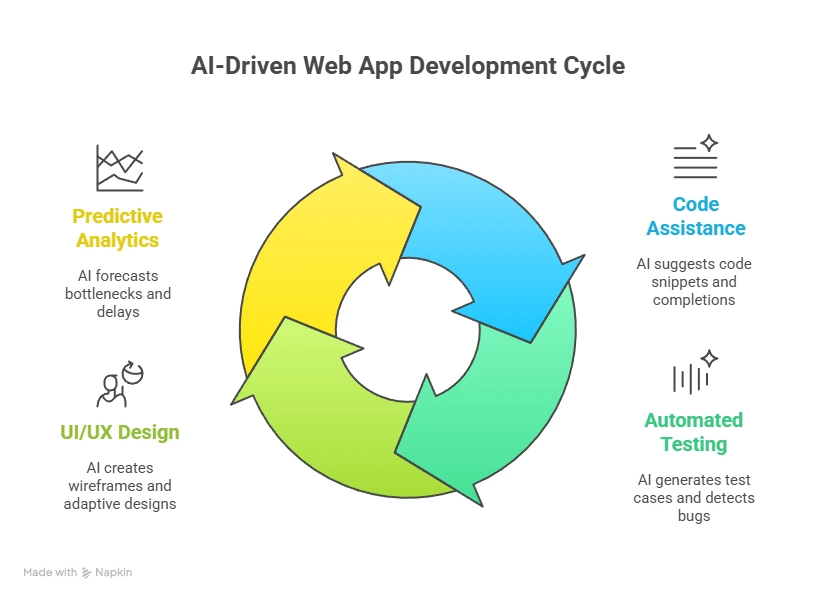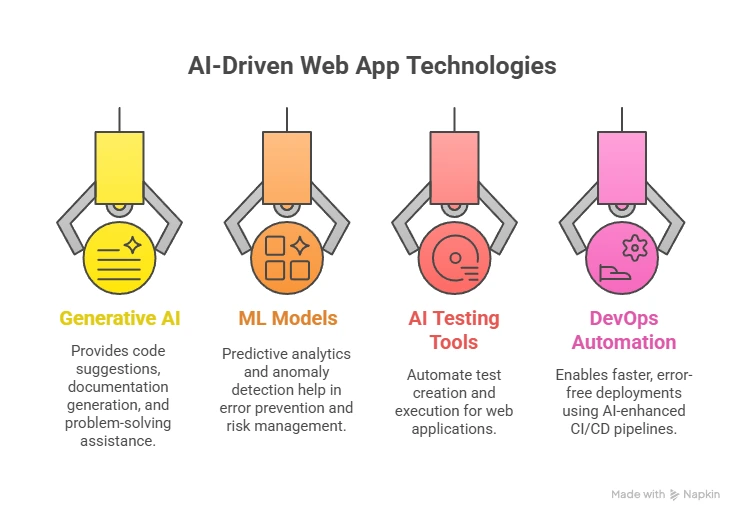In the past, delivering a full-featured web application could take anywhere from six months to a year. Complex backend logic, intricate UI designs, and robust testing cycles meant development timelines were often prolonged. However, over the past few years, we have witnessed a dramatic shift in how web applications are built and deployed. The catalyst? Artificial Intelligence (AI).
At Inceptive Technologies, as a team deeply engaged in AI-driven software development, we have experienced firsthand how AI tools, frameworks, and automation techniques have accelerated web app delivery timelines from six months to just three. This transformation is not just anecdotal—it’s a measurable shift in productivity, efficiency, and innovation.
Understanding the Role of AI in Web App Development
AI in web app development refers to the integration of intelligent algorithms, machine learning models, and automation tools to assist in coding, testing, UI/UX design, and deployment processes. The main objective is to reduce manual effort, minimize errors, and accelerate delivery without compromising quality.

Key AI-driven tools we have implemented include:
-
AI Code Assistants: Platforms like GitHub Copilot, OpenAI Codex, and TabNine analyze the context of our codebase and suggest intelligent code snippets, auto-completions, and even full functions. This has reduced boilerplate coding and accelerated development cycles.
-
Automated Testing with AI: Traditional QA cycles involve manual test writing and regression checks. With AI-based testing tools, we can generate test cases automatically, detect potential bugs before deployment, and perform regression testing faster.
-
AI-Powered UI/UX Design: AI tools can now generate wireframes, suggest layout improvements, and even create adaptive UI designs. By integrating AI-powered design tools like Figma plugins with generative AI, we reduced the UI prototyping time by nearly 40%.
-
Predictive Analytics for Project Planning: Using AI-driven project management platforms, we forecast development bottlenecks, resource allocation issues, and potential delays. This predictive insight allows us to proactively address challenges and maintain tighter delivery schedules.
From 6 Months to 3: How AI Accelerates the Development Cycle
1. Automated Code Generation
Manual coding is one of the most time-consuming aspects of web app development. AI-driven code generation tools allow developers to:
-
Convert requirements directly into code snippets.
-
Generate REST APIs and database integrations with minimal human intervention.
-
Maintain code consistency across the project.
By leveraging AI, what used to take weeks in backend development is now completed in days. In our experience, automating repetitive coding tasks reduced development time by almost 50%.
2. Enhanced Testing and QA
Testing is crucial but traditionally slows down the deployment pipeline. AI accelerates testing by:
-
Automating unit and integration test generation.
-
Predicting potential code failures using historical data.
-
Optimizing regression testing cycles.
As a result, testing that once required 4–6 weeks now takes less than 10 days. This shift alone has dramatically compressed overall timelines.
3. Smarter UI/UX Development
We observed that AI-assisted UI design tools help create adaptive, responsive designs in record time. Generative AI models analyze user behavior, device compatibility, and design best practices to produce polished mockups. Consequently, frontend development and prototyping timelines are significantly reduced.
4. Accelerated DevOps and Deployment
AI isn’t limited to coding and testing—it’s equally transformative in deployment. With AI-enhanced CI/CD pipelines, we can:
-
Predict deployment risks.
-
Automate rollback procedures.
-
Optimize cloud resource allocation.
This reduces downtime and ensures faster, smoother deployment from development to production.
Real-World Benefits We Experienced
From our hands-on experience, the combination of AI in coding, testing, and deployment has led to measurable improvements:
-
50% reduction in development timelines: Projects that traditionally required six months now reach production in three months.
-
Enhanced code quality: AI-assisted code reviews detect potential vulnerabilities and optimize performance.
-
Better collaboration: AI tools facilitate seamless coordination between frontend, backend, and DevOps teams.
-
Cost efficiency: Reduced manual work translates to lower project costs and faster ROI.
Key Technologies Powering AI-Driven Web App Delivery

-
Generative AI: Tools like GPT-4 and GPT-5 provide code suggestions, documentation generation, and problem-solving assistance.
-
Machine Learning Models: Predictive analytics and anomaly detection help in error prevention and risk management.
-
AI-Based Testing Tools: Testim.io, Mabl, and Functionize automate test creation and execution.
-
DevOps Automation Tools: Jenkins, GitHub Actions, and AI-enhanced CI/CD pipelines enable faster, error-free deployments.
Challenges and Considerations
While AI has accelerated delivery, we need to address certain challenges:
-
AI Over-reliance: Developers must validate AI-generated code to avoid potential errors.
-
Data Privacy: AI tools often require access to project data. Ensuring compliance with GDPR, SOC-2, and HIPAA is crucial.
-
Integration Complexity: Existing legacy systems may require careful adaptation to AI-based workflows.
Despite these challenges, the benefits far outweigh the limitations when AI is integrated thoughtfully.
Future of Web App Development with AI
Looking ahead, we anticipate even shorter development cycles, possibly weeks instead of months. Emerging trends include:
-
AI-driven project management: Real-time resource allocation, risk assessment, and sprint planning.
-
Full-stack AI assistance: From frontend to backend, AI will provide end-to-end support.
-
Self-optimizing code: AI systems capable of auto-refactoring code for performance and security.
The AI revolution is poised to redefine software development as we know it.
FAQs
1. How much faster can AI make web app development?
Based on our experience, AI can cut development timelines by up to 50%, allowing projects that usually take six months to complete in three months.
2. Can AI replace human developers?
AI is a powerful assistant but cannot fully replace developers. Human expertise is essential for validation, architecture decisions, and strategic planning.
3. Which AI tools are best for web app development?
Popular tools include GitHub Copilot, TabNine, OpenAI Codex for coding; Testim.io and Mabl for testing; Figma plugins for UI/UX; and AI-enhanced CI/CD pipelines for deployment.
4. Does AI impact code quality?
Yes, positively. AI-assisted code generation and reviews help identify bugs, vulnerabilities, and optimization opportunities, improving overall code quality.
5. Is AI suitable for enterprise-level applications?
Absolutely. AI is particularly effective in complex projects with large codebases, multiple integrations, and strict timelines, helping enterprises accelerate delivery without compromising security or performance.
Resource Center
These aren’t just blogs – they’re bite-sized strategies for navigating a fast-moving business world. So pour yourself a cup, settle in, and discover insights that could shape your next big move.
What Industries Benefit the Most from AI Development Services?
Top Industries Transforming with AI Development Services Artificial Intelligence is no longer an experimental technology reserved for research labs. It has become a strategic growth engine across global markets. [...]
Should You Hire an In-House or Remote .NET Developer?
In today’s competitive digital ecosystem, the success of your software product often depends on one critical decision — how you hire your .NET developer. Whether you are building enterprise [...]
How Much Does It Cost to Build a Generative AI Solution?
Generative AI is no longer an experimental technology—it is a business accelerator. From AI-powered chatbots and intelligent document automation to custom large language model (LLM) integrations and AI copilots, [...]

